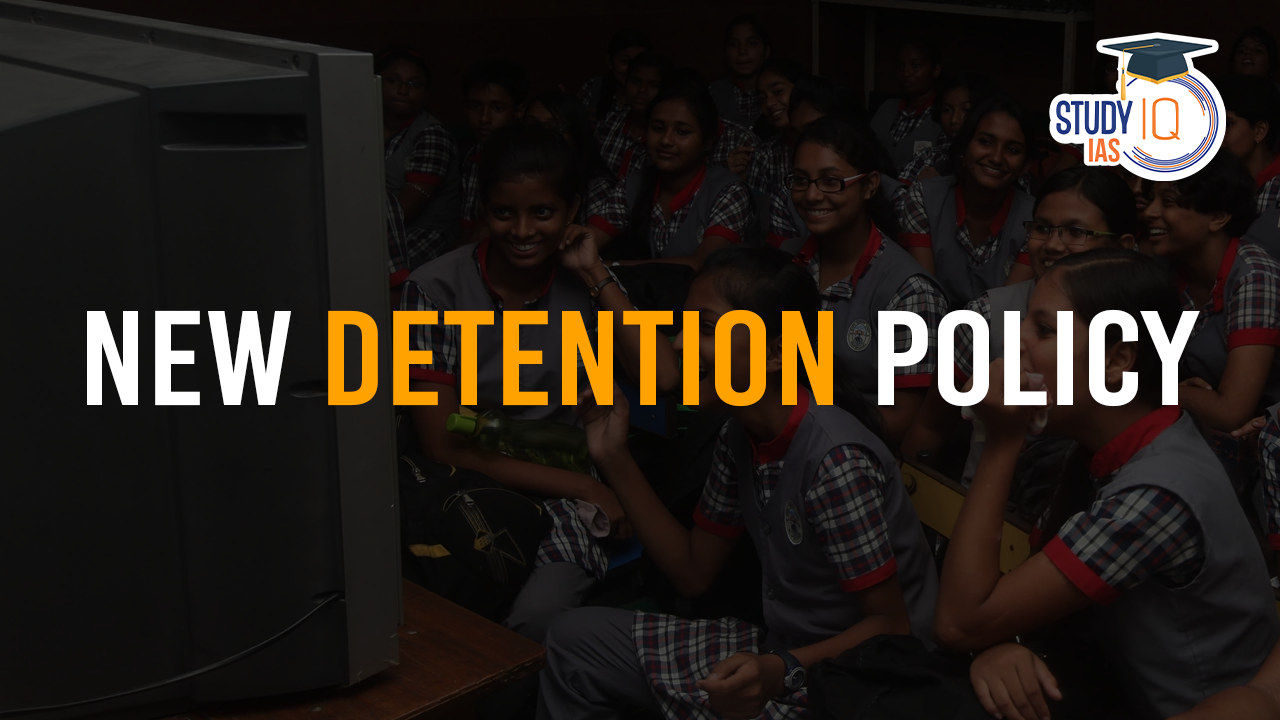Table of Contents
About New Detention Policy
- Provision: Students in Classes 5 and 8 in around 3,000 central schools, including Kendriya Vidyalayas and Jawahar Navodaya Vidyalayas, fail regular exams, the student will be re-examined after 2 months after additional instruction.
- If they fail the re-exam, they may be
- Exam Format: Exams and re-exams must be competency-based.
- Key Safeguard: No child can be expelled from school until the completion of elementary education.
Legislative and Policy Background
- Right to Education (RTE) Act, 2009: Section 16 prohibited detaining students up to Class 8.
- Amendment in 2019:
- Allowed states and UTs to decide on holding back students in Classes 5 and 8 if they failed re-examinations.
- Since then, 18 States/UTs have scrapped the no-detention policy.
Arguments in Favour of New Detention Policy
- Declining Learning Levels: Automatic promotion leads to reduced efforts by students and teachers, resulting in poor educational outcomes.
- Eg., Only 43.3% of 14-18-year-olds are able to solve division problems correctly (ASER Report 2022).
- Higher Failures in Later Classes: Foundational gaps due to automatic promotion contribute to high failure rates in Classes 10 and 12, with 65 lakh students failing in 2023.
- Increased Accountability: Encourages both students and teachers to focus on academic performance, fostering responsibility and commitment.
- Global Best Practices: Many countries use structured assessments and remedial measures, emphasizing accountability over automatic promotion.
- Eg.,
- S. “Grade Retention” System: It is a practice often used when students fall significantly behind in core subjects like reading and math, particularly when their performance on standardized tests falls below state-mandated standards.
- Demographic Dividend: An educated, capable, and skilled population is essential for leveraging India’s demographic advantage, making improvements in education critical.
- Eg.,
Arguments Against the New Detention Policy
- Risk of Dropouts: Detaining students may demotivate them, especially those from marginalized backgrounds, potentially increasing dropout rates.
- Blames Students, Not the System: Fails to address systemic issues like inadequate teacher training, poor infrastructure, and socio-economic challenges.
- Stress on Students: The fear of failure and detention could lead to anxiety and stress, negatively impacting mental health.
- Disproportionate Impact on Marginalized Groups: Students from underprivileged backgrounds, already struggling with systemic inequities, may bear the brunt of this policy.
- Potential Misuse by Schools: Without proper monitoring, schools may misuse the policy to justify administrative shortcomings or underperformance.
- Contradiction with NEP 2020: The NEP advocates formative assessments, self and peer evaluations, and a holistic, 360-degree progress report. The new detention policy fails to align with these forward-looking principles.


 Rural Development Needs People, Not Just...
Rural Development Needs People, Not Just...
 Exploration of India’s Mineral Diploma...
Exploration of India’s Mineral Diploma...
 Are India’s Small Towns Being Increasi...
Are India’s Small Towns Being Increasi...

























